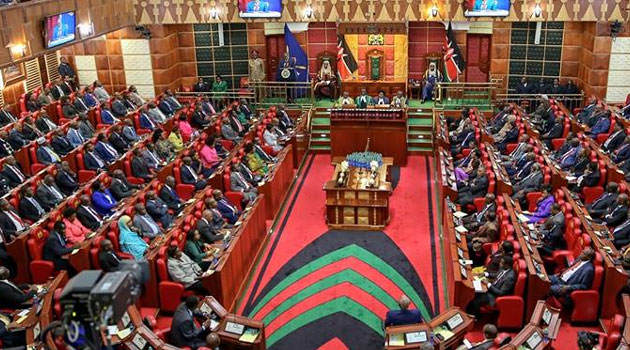Senate’s Stand-off Over Revenue Share is Hurting Counties
The Senate failed six times in a month to pass amendments on revenue sharing formula. This has a negative impact on county governments because they cannot budget since they don’t know how much to expect.

Both governors and other senior political leaders have termed the stand-off in the senate as one that could paralyse the functioning of Kenya’s devolved units.
By July 28th, senators were expected to attempt for a sixth time to pass amendments that could give more money to counties with higher population, rather than land mass as had been the previous methodology. Unfortunately, senators could not come to an agreement, again.
On July 27th, former Prime Minister Raila Odinga said the stand-off had created unnecessary “paralysis and mistrust” at a time when the country should be united against Covid-19.
“It has also taken a dangerous ethnic undertone instead of being a level-headed debate on the nation’s development trajectory,” Odinga said.
The genesis of the dispute is that a proposal by the Commission on Revenue Allocation (CRA), recommended that counties with more people be given more money.
More people more money
The formula proposes that more people need more services and hence more money to provide those services. This alteration annoyed leaders from counties in arid and semi-arid regions, who routinely receive equal amounts of money with the rest, despite having fewer people.
“They should come up with a formula that will balance allocations. If you lose a small amount, that will be okay because you will be able to implement your budget,” Wycliffe Oparanya, the Chairman of the Council of Governors told reporters on July 24th.
CRA is mandated under Kenya’s Constitution, Article 216(1) to draw up the formula of sharing between counties [horizontal] while the National Treasury may propose the share between the national government and counties [vertical]. Under the CRA proposal, 29 counties are gaining while 18 are losing
The horizontal proposal, a Supreme Court, ruled in May 2019 may still be subjected to amendments by the Senate. But when the Senate made amendments, as it should under Article 217(1) every five years, a division ensued.
Isaac Mwaura, a nominated Senator who represents people with disabilities, argued priority should be on serving people. “We do not allocate money to empty land. That was a mistake. We are saying that people should be beneficiaries.”
However, counties with fewer people read mischief and protested an attempt to be marginalised. Jumuiya ya Kaunti za Pwani [JKP], an association of Coastal counties said they will sue if they lose any share in the changes. Under the CRA proposal, 29 counties are gaining while 18 are losing
Stewart Madzayo, Senator Kilifi county, argued poorer counties may remain poor because money meant to help build roads, hospitals and other amenities won’t be available.
Legal implications
Most of the poor counties may lose at least Sh1 billion on their annual allocation if the new formula is passed. Ali Roba, Mandera Governor and chairman of Frontier Counties, an association of counties in the former colonial Northern Frontier District warned the local administrations could simply shelve planned projects to survive.
The stand-off is legally dangerous for the senate as an offended citizen can use to have it dissolved. If it continues, the National Assembly may pass a motion to allow counties to draw from the Consolidated Fund allowing them to spend on crucial needs.The delay in passing the share means counties cannot know the amount of money to budget for this year.
In May, this year, the Supreme Court ruled that Parliament must first approve a bill on the amount of money to be shared to the 47 counties before passing the budgetary allocation for the national government. But that is hampered if the formula is in limbo.
Counties have already suffered locust invasions, erratic weather and Covid-19 has spread to most counties. On July 24th 2019, the ministry of health announced that 44 out of 47 counties had reported cases of Covid-19.
In some counties like Kisumu, medics had been on strike for more than a month, demanding their pay. Health being a devolved function, the county could not pay unless allocated resources from the national government.
The workers returned to work, in early July, after, the Labour Court sitting in Kisumu on June 25 said their strike was illegal. However, while they did resume their duties, they are not motivated to work.
This financial year, the Division of Revenue law allocated Sh316 billion for the next financial year. This money is to be shared equitably between the 47 counties. However, it has to await for the formula to come out.
How the formula works
The new formula used a basic index of 20 per cent then population (18 per cent), followed by the health index (17 per cent), agriculture, land area (8 per cent) as well as rural access (4 per cent) to determine who gets what.
But unless the Senate approves a certain methodology, there could be further delays in disbursement of funds. This has been a perennial problem since devolution kicked started in 2013.
Counties depend on this money 70 per cent of the time to run their affairs, according to an analysis by the Kenya Institute of Public Policy Research and Analysis (Kippra).
Delays in disbursement by the National Treasury adversely affects the day to day running of county activities. It leads to delayed payment of county staff, suppliers, and implementation of county work plans.
What journalists should do:
- Should the formula pass, analyse the impact on local development. Check if services are better or worse.
- Analyse authenticity in arguments for those against and for the formula.
- Find out how specific counties are affected by this delay in resource allocation.